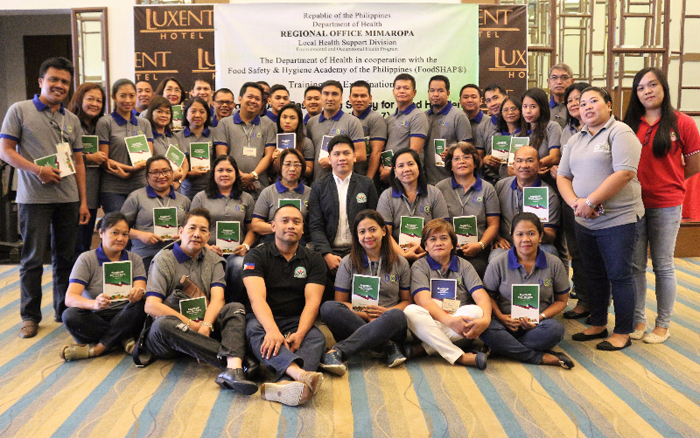DOH-MIMAROPA and FoodSHAP Staff, together with the various Sanitary Inspectors of the region poses after taking a rigorous examination during the 'FIT' program held on August 15-17, 2017 at Luxent Hotel in Timog, Quezon City. (Photo courtesy of GLEN S. RAMOS, Community Affairs and Media Relations Officer, DOH-MIMAROPA)
PUERTO PRINCESA CITY, Palawan-- Sanitary inspectors in this city and the province of Palawan recently joined 40 others in completing the three-day strict Food Inspector Training (FIT) spearheaded by the Department of Health (DOH)-MIMAROPA.
In a press release received on Friday from the DOH-MIMAROPA, Regional Director Eduardo Janairo said the participants were from various municipalities in five provinces of the region, They completed the FIT program held in Quezon City and ended on Thursday.
The “Basic Food Safety for Food Handlers” and “Hazard Analysis Critical Control Point (HACCP) Principles and Practice for Catering” is the first part of a two- set FIT program. The second part is a three-day “Food Safety Compliance Officer Training”.
“This training was strictly conducted with the inclusion of a written and practical examination after every lesson in order to assess and verify that participants have understood the concepts presented and being taught. Those who will not pass the examination will have one chance to retake the test,” Janairo stated.
“It’s never safe to assume that sanitary inspectors are already well-informed without having been properly trained. That is why it is important that they understand the risks associated with producing unsafe foods and be familiarized with terms like food safety, cross-contamination, (the transfer of a potentially hazardous substance to another surface or food) and various types of bacteria that are potentially dangerous if present in food,” he emphasized.
The training aims to update the skills and provide sanitary inspectors the right knowledge on the proper handling, preparation, and storage of food in ways that prevent foodborne illness and food poisoning.
“Sanitary Inspectors are indispensable part of our healthcare system because they protect the public from food and water-borne illnesses and unsanitary, misbranded or adulterated foods that proliferate and being sold carelessly in the market,” Janairo explained.
“The prevention and control of diseases depends primarily on their proper implementation of food safety policies and environmental sanitation regulations in the community,” he added.
The Basic Food Safety Training coverage includes introduction to food safety, food hazards, illness from food, high-risk food, time and temperature control, personal hygiene, food safety training, premises and equipment, cleaning and sanitizing, pest control, staying safe in the kitchen and the flow of food.
The HACCP Principles and Practice for Catering training coverage includes conducting hazard analysis, developing corrective actions, determining critical control points, conducting verification, establishing critical limits and keeping documented information.
Under the Food Safety Act of 2013, the DOH shall be responsible for the safety of processed and prepackaged foods, foods locally produced or imported and the conduct of monitoring and epidemiological studies on food-borne illnesses;
The local government units, through their sanitary inspectors, shall be responsible for food safety in food businesses such as, but not limited to, activities in slaughterhouses, dressing plants, fish ports, wet markets, supermarkets, school canteens, restaurants, catering establishments and water refilling stations including the street food sale and ambulant vending.
The FIT Program for MIMAROPA Sanitary Inspectors was conducted in partnership with the Food Safety and Hygiene Academy of the Philippines (FoodSHAP®) and in charge of developing the National Food Safety Training & Examination System and the first training and examination provider in food safety and hygiene for food handlers. (PNA)

